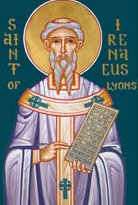St Irenaeus

Bishop and Martyr. Born around 130 AD, Irenaeus of Lyons was bishop of Lugdunum in Gaul, (now Lyons) in France. His writings were formative in the early development of Christian theology. He was a disciple of Polycarp of Smyrna, who himself was a disciple of the Apostle John the Theologian.
Irenaeus is thought to have been a Greek from Smyrna in Asia Minor, now Izmir, Turkey. He was brought up in a Christian family. Irenaeus was one of the first Christian writers to refer to the principle of Apostolic Succession.
St Irenaeus is remembered as the second bishop of Lyons, although there is no clear evidence that he ever officially assumed the episcopal duties. The first bishop, Pothinus, was martyred around 177 during persecutions under Marcus Aurelius, when Irenaeus was visiting Rome.
Irenaeus was martyred in 202, but there is no information about his death. He was buried under the church of Saint John in Lyons, which was later renamed St Irenaeus. His tomb and his remains were destroyed in 1562 by the Calvinist Huguenots.
Irenaeus wrote a number of books. The most important that survives is the five-volume work against heresies. Only fragments in its original Greek exist, but a complete copy exists in a wooden Latin translation, made shortly after its publication in Greek, and Books IV and V are present in a literal Armenian translation.
The purpose of Against Heresies was to refute the teachings of various gnostic groups that existed at the time.
Irenaeus was the first Christian writer to describe all four Gospels as divinely inspired.
The central point of his theology is the unity of God, in opposition to the Gnostics' division of God into a number of divine 'Aeons'. Christ, for him, is the invisible Father made visible.
His emphasis on the unity of God is reflected in his corresponding emphasis on the unity of salvation history. Irenaeus repeatedly insists that God created the world and has been overseeing it ever since. Everything that has happened is part of his plan for humanity. The essence of this plan is maturation: Irenaeus believes that humanity was created immature, and God intended his creatures to take time to grow into his likeness. Thus, Adam and Eve were created as children. Their Fall was thus not a full-blown rebellion but a childish spat, a desire to grow up before their time and have everything now.
Everything that has happened since has therefore been directed by God to help humanity overcome this and grow up. The world has been designed by God as a difficult place, where human beings are forced to make moral decisions - only in this way can they mature. Irenaeus likens death to the whale that swallowed Jonah: it was only in the depths of the whale's belly that Jonah could turn to God and do his will. Similarly, death and suffering appear evil, but without them we could never come to know God.
The high point in salvation history is Jesus Christ. Irenaeus believes that Christ would always have been sent, even if humanity had never sinned; but the fact that they did sin determines his role as a saviour. He sees Christ as the new Adam, who systematically undoes what Adam did: thus, where Adam was disobedient about the fruit of a tree, Christ was obedient even to death on the wood of a tree.
Irenaeus is the first to draw comparisons between Eve and the Theotokos, contrasting the faithlessness of the former with the faithfulness of the latter. In addition to reversing the wrongs done by Adam, Irenaeus thinks of Christ as "recapitulating" or "summing up" human life. This means that Christ goes through every stage of human life, from infancy to old age, and simply by living it, sanctifies it with his divinity. Irenaeus is therefore forced to argue that Christ did not die until he was quite old!
Irenaeus thus thinks that our salvation comes about, essentially, through the incarnation of God as man. He characterises the penalty for sin as death and corruption. God, however, is immortal and incorruptible, and simply by becoming united to human nature in Christ he conveys those qualities to us. Irenaeus understands the atonement of Christ as happening through his incarnation rather than his crucifixion, although the latter is an integral part of the former.












